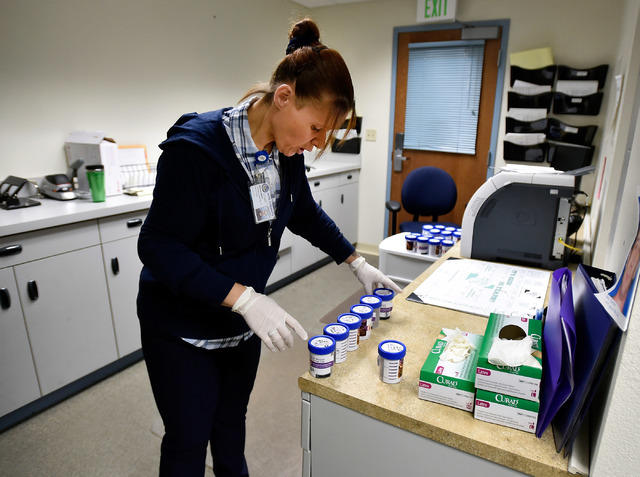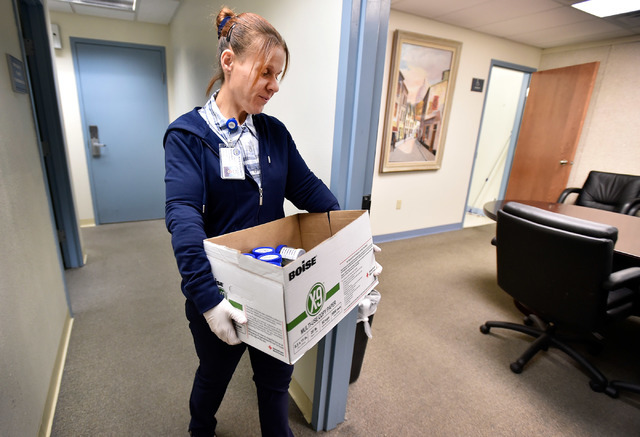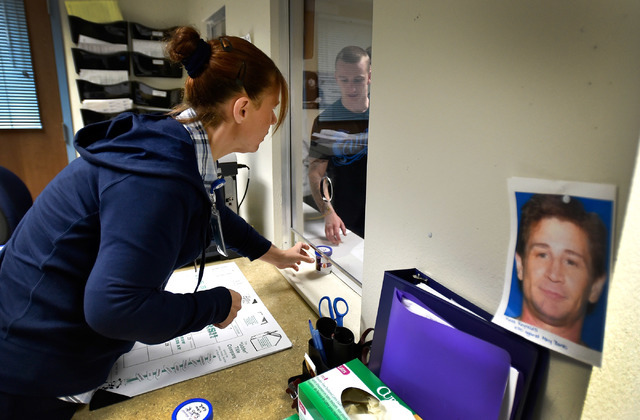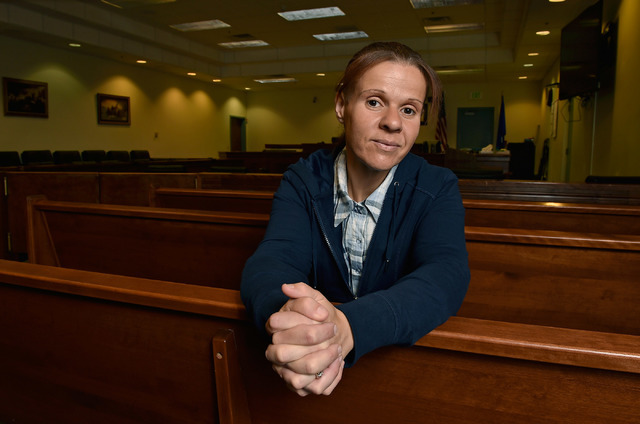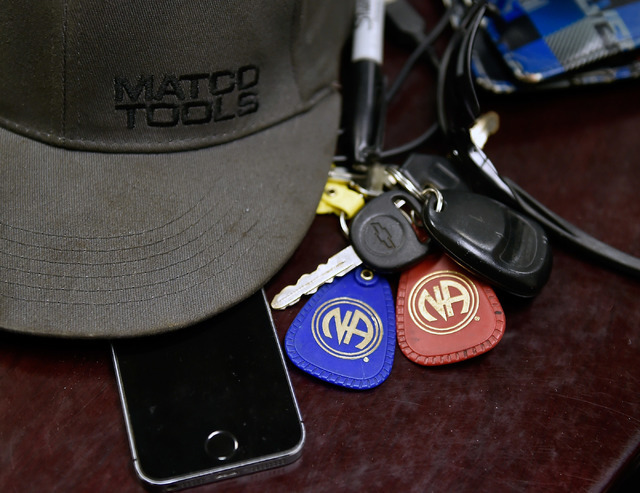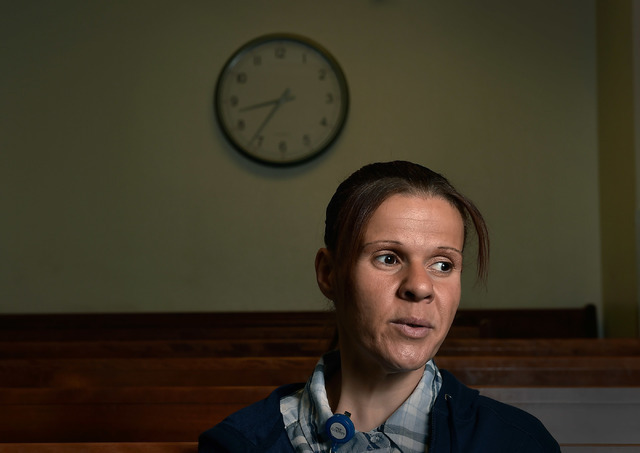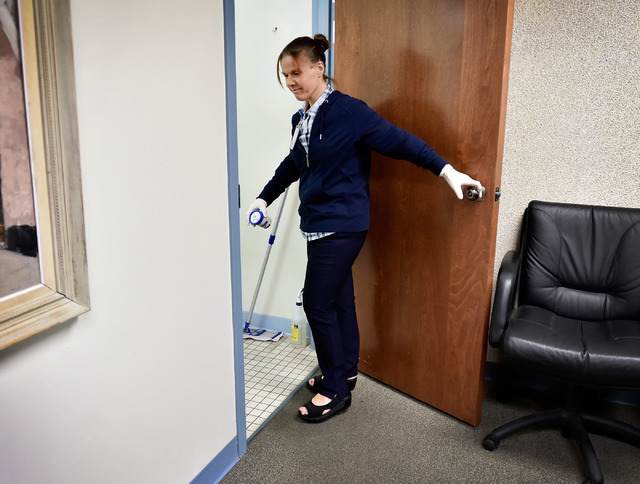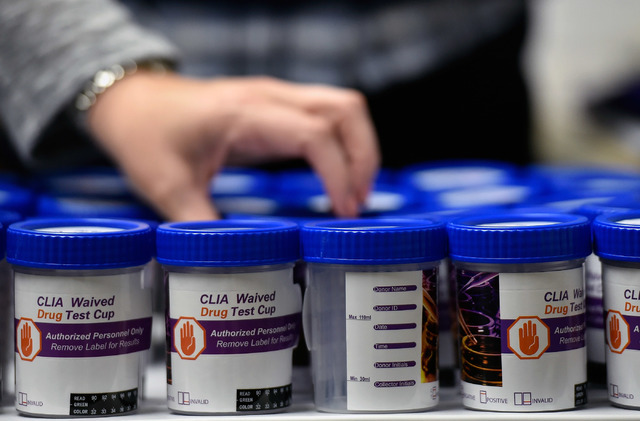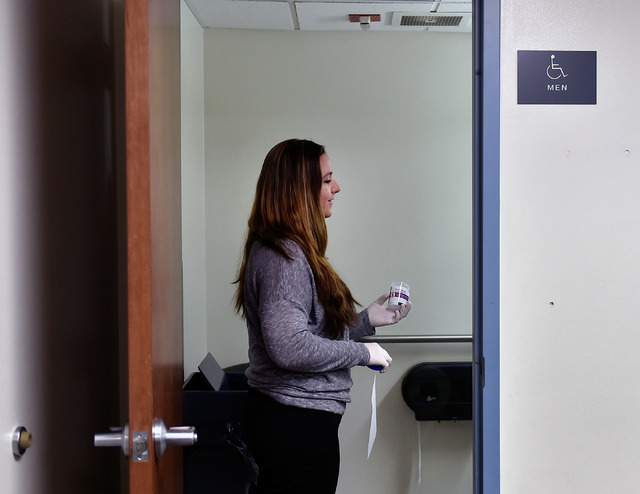Sarge, an ex-user, helps coordinate Nye County drug program
PAHRUMP
The drug crowd shows up outside the Nye County Courthouse with the morning sun still an upstart; many, it seems, dressed in the same clothes they had worn the night before.
Some peer ahead in a trance, not yet awake. Others stand at the door, cigarettes hanging from their lips, arms crossed defensively, squinting into the hard-slanting light.
Mothers pull along children. One 3-year-old girl guides a stroller bearing a Cabbage Patch doll, unaware that a judge has termed Mommy a habitual offender who must appear here at random times each week to urinate into a bottle and prove she’s not using.
“I gotta get to work,” one woman complains. “I ain’t got time for this BS today.”
The regimen is called The Drop, and nobody wants to be here. When the doors open at 7 a.m., men with pants dangling on their hips and women without makeup congregate dourly in a waiting room where “One Day at a Time” is scrawled across a mirror. They make cynical cracks, rolling their eyes, waiting for their names to be called.
On this morning, like most others, “Sarge” is there to meet them. She’s a boss lady, a petite drill instructor and, sometimes, a knowing confidante.
Just don’t cross her; that’s the street-corner wisdom here.
Because Melissa Mevis once walked in these same drug-doing shoes. Twelve years ago, she made these same postdawn courthouse appearances, dragging her two young daughters, trying to show a judge and anybody else who cared that she was clean, ready to start a new life.
But that was long ago, when Mevis had a taste for meth and pot and bad choices. Now, at 34, she helps coordinate the county’s drug program; she’s a graduate-made-good who analyzes urine samples rather than gives them. With a practiced eye, she sizes up these street players to gauge whether, on this morning or any other, they’re telling the truth.
These drug users know they lie to Sarge at their own peril.
The day before, each participant in Nye County’s drug court — a get-help program that is an alternative to prison — called in to hear a recording in which Mevis reads off the colors being summoned for the next day’s drug test: Red. Purple. Pearl. Lime.
The voice is no-nonsense, a bit weary, coming from a woman who has attended that party, taken that drug.
Mevis assists Fifth Judicial District Court Judge Kim Wanker, who oversees the drug court program. Mevis takes the urine samples, stands by in court and keeps an eye on those now-familiar frowning faces as Wanker hears their cases.
The judge gave Mevis the nickname Sarge.
“Melissa is no-nonsense; she knows crap when she hears it,” Wanker said. “She’ll barge right into my office to get her answers. She wants stuff done, and she wants it done now.”
Mevis says the Sarge name fits.
“Maybe it’s because I’m bossy, impatient,” she says. “I need things done right away.”
That morning at The Drop, Mevis rolls open the window to the crowded waiting room and calls a woman’s name. A 30-something blonde jumps up and walks down the narrow hallway, her spiked hair rising like an unmowed lawn. Her arms bear purple tattoos, she wears a black shirt with the word “Blessed.” Her 5-year-old daughter trails behind her.
The testing takes place inside a jury deliberation room, where participants leave their valuables on a table and step into either a men’s or women’s bathroom. Mevis follows the blonde into the restroom, the little girl in tow, and closes the door behind them.
The chatter is bright, considering the circumstances.
“How you doing today?”
“I’m great! Yourself?”
“It’s too early to tell.”
Mevis is all ears. Tell her you lost your job, and she will make calls to help you find another one. She’s got a soft spot for mothers struggling to feed and clothe their kids.
But do her wrong, give her an attitude, and she will be there like a drill sergeant dropping you for 50 push-ups. Walk in a minute late, and Mevis will turn you away cold. Dress down, wear pajamas to her drug test sessions, and you’re a goner.
“Melissa’s always right there to call you out if you get out of line,” said Alana Murphy, 22, a local brothel worker who wears a T-shirt bearing the phrase “Bunny Ranch. Eat Fresh.” “She’s smart, and she’s been there. I can lie to my friends, but not to her.”
Nearby, 18-year-old Blake Drouillard, whose heroin habit landed him in drug court, shook his head in a sort of dark admiration.
“Yeah,” he said. “It’s like, before you even do it, she’s right there, knowing you’re gonna do it.”
Sherie Winn, 54, a blonde whose looks have hardened from her heroin habit, has seen Mevis go from light to dark when she suspects she’s being played.
“She’ll seem real nice, and then, if something happens she doesn’t like, her whole attitude changes, and you’re like, ‘Oh no, I’m busted,’” she said.
“But if you’re behaving, she can be your best friend. I think Melissa gives us all hope: Because if she can do it, if she can beat these drugs, then so can we.”
METH AT 16
Mevis grew up in Pahrump, the daughter of a butcher. She wasn’t a bad kid, but she hung out with troublemakers. She first did meth at age 16. She liked the rush but hated the next day, when she felt depressed coming down.
She did a stint in juvenile hall and later, after high school graduation, started waitressing. But she couldn’t give up her drug crowd. She lost her job, and crashed.
“I wasn’t used to doing meth and then not having any more,” she said.
She lived in a succession of trailers and cheap motels. For a while, authorities took custody of her first daughter. Then she got arrested for receiving stolen property.
In 2004, she ended up in drug court, bitter and angry.
“I didn’t like it at first,” she says. “I thought my counselor was against me.”
Turns out, drug court didn’t much like her either.
“She was just hard, abrasive,” Fifth Judicial District Court Judge Robert W. Lane says. “She annoyed the heck out of me.”
But Mevis got the hang of the system, which she says gave her life structure: regular drug tests, counseling sessions and group events such as potlucks where she brought her daughters. She rarely, if ever, missed The Drop.
Along the way, she knew when her fellow drug court goers were high; she read through their lies, how they said they weren’t still using, when everyone could tell they were.
And that, Lane says, is a talent few judges possess.
“It’s the beauty of her role with the program,” he says. “I’m a Mormon; I’ve never had a drink. So I can’t relate those these people’s lives. But there’s a saying that in Drug Court, that when their lips are moving, they’re lying to you. Melissa can see through the lies.”
And she brooks no excuses. When newcomers learn the rules of making a $30 contribution to the program, they complain that they don’t even have a job; how are they supposed to pay?
“Do it the same way you got your drugs without a job,” Mevis tells them. “If you could get the money then, you can get it now.”
Mevis finall finished her drug court stint in 2006. Then she did something no graduate had ever done: She came back, looking to volunteer.
Then-program coordinator Tammi Odegard saw how Mevis wanted to put her drug past behind her and gave her a chance. She soon saw Mevis grow as a woman and as a mother; in 2009, Mevis took a paying job with the program.
As she got on her feet financially, Mevis did something else Odegard had never seen before: She took herself off government aid programs.
“She did her research on who to call and then got on the phone with Section 8 housing and other programs,” Odegard said. “People said they’d never had anyone call and take themselves off the program. Seeing that, it was just my proudest day for Melissa.”
SUCCESS STORIES DO HAPPEN
It’s just after 8 a.m. and results from The Drop are in: Out of 37 clients, two failed their tests. Mevis could smell booze on one man’s breath. There were six no-shows.
Gritty work lies ahead: Mevis empties the urine vials and mops the bathrooms. She doesn’t mind because she is seeing success in many people here.
And her own life continues to progress. She’s now a mother of four, with twin 5-year-olds. Her two eldest, now teenage girls, are good students. Their mother sees to that.
Sometimes, Mevis will a see a face from the old days, somebody she met during her Drug Court stint who is back again, on drugs and in trouble.
“It’s sad to see,” she says. “Because you know how hard they worked to get clean the first time.”
In a few days, she planned to accompany Wanker on a trip to Tonopah to celebrate one man’s graduation from drug court there. Those are the stories Mevis likes to see: people who beat the drug life.
“I don’t think I could ever live like that again,” she says. “I have four kids; that’s chaotic enough.”
The previous online headline for this story was incorrect. It has been updated.




